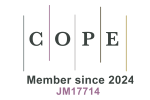Webinar series ‘How to conduct and publish excellent research on traffic safety’—part 5
The upcoming speaker is Lars Ekman, traffic safety expert at Swedish Transport Administration (recently retired).
.
A complaint may arise over the conduct of editors and/or peer reviewers. Some possible reasons for complaints are:
An appeal is a formal request to reconsider a decision taken by the journal. It might be related to decisions in regular journal operation (e.g. a manuscript being rejected) or to a verdict taken by a team investigating a particular situation (e.g. a published manuscript being retracted due to suspected data manipulation).
The authors submit a formal complaint/appeal to the journal principal contact by email or post (see the contact details here). Within a week, the journal will form an investigation group consisting of at least three editorial team members (not previously involved in handling the manuscript in question) and report back their names and how they can be contacted.
The actual investigation time may vary depending on the complexity of the case. The investigation team provides fair opportunities to all parties involved to explain their motives and actions. The purpose of the investigation is to establish whether misconduct took place (as reported or in the light of new circumstances discovered), whether it was performed deliberately or as a genuine mistake, and to estimate the scale of its negative consequences.
Based on the facts collected, the investigation team decides on the corrective actions to be taken as well as whether some penalty to be applied to the person who performed the misconduct. Depending on the misconduct severity, the penalty may range from a reprimand to an expulsion from the reviewer pool/editorial board and a report being sent to the institution to which the person in question is affiliated.
The authors are informed about the investigation outcome upon its completion.
In its work, the investigation group relies on the recommendations and guidelines provided by Committee on Publication Ethics (COPE). In complex cases, an external ethical advisor might be called for.
The upcoming speaker is Lars Ekman, traffic safety expert at Swedish Transport Administration (recently retired).
.
|
ISSN 2004-3082 (online) Editor-in-chief: |
 |
